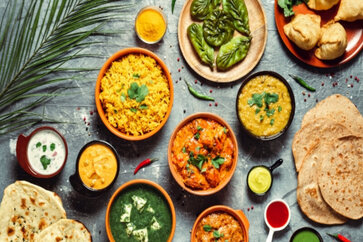What Are The Rules For Eating Food In Ayurveda?
 Healthy eating is one that provides each individual with all the necessary food to meet their nutritional needs, in the different stages of life (childhood, adolescence, adulthood, and aging), and in a healthy situation.
Healthy eating is one that provides each individual with all the necessary food to meet their nutritional needs, in the different stages of life (childhood, adolescence, adulthood, and aging), and in a healthy situation.
Keep in mind that this section refers to healthy eating in general, and you can use it as a basis for your daily diet. In the case of presenting specific symptoms related to the disease or treatment, you should go to the section on specific dietary recommendations.
Each person has nutritional requirements based on their age, sex, height, physical activity that they develop, and state of health or disease.
To maintain health and prevent the appearance of many diseases, you must follow a healthy lifestyle; In other words, you have to choose a balanced diet, do regular physical activity or exercise (at least walk for at least 30 minutes a day), and avoid smoking and drinking high alcoholic beverages.
What Healthy Diet you should have?
A healthy diet must meet the following characteristics:
- It must be complete: it must provide all the nutrients the body needs: carbohydrates, fats, proteins, vitamins, minerals, and water.
- It has to be balanced: the nutrients must be distributed in proportion to each other. Thus, carbohydrates (CHO) must account for between 55 and 60% of the total kcal per day; fats, between 25 and 30%; and proteins, between 12 and 15%. You also have to drink 1.5 to 2 liters of water a day.
- It must be sufficient: the amount of food must be adequate to maintain weight within normal ranges and, in children, achieve proportional growth and development.
- It has to be adapted to the age, sex, height, physical activity carried out, the work carried out by the person and state of health.
- It must be varied: it must contain different foods from each of the groups (dairy, fruits, vegetables, cereals, legumes, meat and poultry, fish, etc.), not only because it will be more pleasant, but also because, the greater the variety, the greater the security of guaranteeing all the necessary nutrients
Ayurvedic View On Healthy Eating
According to Ayurveda, how you eat your food is even more important than what you eat. Even foods that tend to cause imbalance digest quite well if the rules are followed correctly.
Similarly, if you eat the right foods in the opposite direction, your digestion will be compromised, because indigestion, gas, and the formation of ama will continue.
If you follow the following eating habits and choose the correct foods, then your digestion will work at its best, and you will experience optimal digestion.
- Chew food thoroughly until smooth before swallowing.
- Don’t eat while distracted by television, conversation, or excessive reading.
- Don’t have cold drinks right before eating. That weakens digestion.
- Do not drink large amounts of fluids during meals, as this also weakens the digestive fire. Half a cup of water at room temperature is right on average. Dry foods may require more, and wet foods, such as soup, require none. It’s okay to have some wine during a meal.
- Eat only food prepared by loving hands and in a loving manner. The energy of the cook is always in the food.
- Avoid eating food prepared with resentment. We not only take the food, but also the emotions of the chef.
- Make eating a sacred ritual. Pause for a moment, relax, and give thanks before you begin.
- After dinner, rest for a short time to allow food to digest before moving on to the next activity.
- Eat at a moderate pace until you are three-quarters full.
- Allow three hours between meals so that you can digest your food well.
- Digestion is strongest around noon when the sun is at its peak. The rhythms of the body are similar to those of the universe. Therefore, it is best to eat your largest meal at noon. Instead, the morning and evening meals should be lighter.
- Drink water and drink at room temperature or warmer. Cold drinks destroy digestive fire and slow digestion. This is true not only at mealtime but for the entire day.
- Allow three hours between meals to digest well. This allows most people to have three to five meals a day. Especially those with a vata nature or imbalance should eat four or five times a day.























